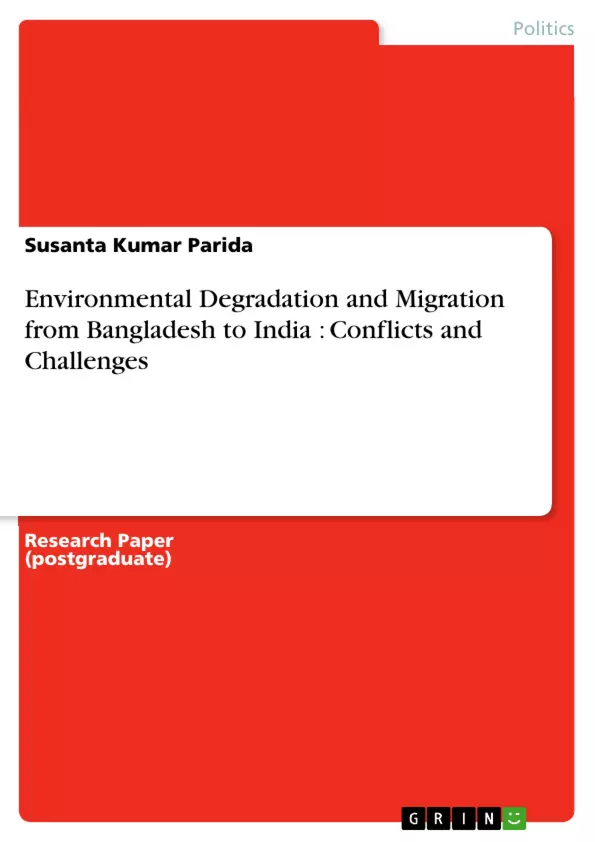In the era of globalisation, where opening of borders is being advocated all over the world, there is one issue over which no nation-state is ready to compromise with its territorial borders. The issue of migration and refugees is considered so sensitive that states have often linked it with their sovereignty, independence and even existence. Environmental degradation has become a crucial issue in the contemporary world. The effects of climate change are likely to trigger mass human movement both within and across international borders. The United Nations High Commissioner for Refugees (“UNHCR”) predicts that between 50 and 200 million people may be displaced by 2050. Thus, the human impact on the environment is creating a new kind of global casualty for the twenty-first century—an emergent class of environmental migrants. Environmental crisis in the rural areas of developing countries is increasingly becoming an important cause of cross-border migration of population and South Asia is no exception to this phenomenon. Such movement of population in the Indo-Bangladesh context is generating a range of destabilising socio-political, economic, ethnic and communal tensions in India. It has embittered Indo-Bangladesh relations, causing tensions between the two countries.
.
Inhaltsverzeichnis (Table of Contents)
- I. Introduction
- Significance of the study
- Literature Review
- Objectives
- Hypothesis
- Research Methodology
- Chapterization
- II. Environmental Conflict: A Conceptual Analysis
- Evolution of Environmental Conflict Research
- III. Environmental Degradation in Bangladesh
- Sea Level Rise
- River Bank Erosion
- Coastal Erosion
- Population pressure
- Flood
- Decline in the Quality and Quantity of Freshwater Resources
- Air Pollution
- Cyclones & Storms
- Loss of Bio-diversity
- IV. Consequences of Environmental Degradation
- Decline in Agricultural Productivity
- Economic Decline
Zielsetzung und Themenschwerpunkte (Objectives and Key Themes)
This research aims to investigate the environmental degradation in Bangladesh and its consequences. It examines the interplay between environmental change and social conflict, exploring the impact on the country's socio-economic stability. The study delves into the causes and consequences of environmental degradation, analyzing its impact on agricultural productivity and the overall economy. Key themes and objectives of the study include: * Understanding the causes of environmental degradation in Bangladesh, focusing on key factors like sea level rise, river bank erosion, coastal erosion, population pressure, flooding, and air pollution. * Investigating the impact of environmental degradation on the country's social and economic fabric, particularly focusing on agricultural productivity and economic decline. * Analyzing the relationship between environmental change and the potential for social and political conflict. * Examining the challenges faced by Bangladesh in addressing environmental degradation and its consequences.Zusammenfassung der Kapitel (Chapter Summaries)
Chapter I introduces the significance of the study, providing a background on environmental degradation and conflict in Bangladesh. It lays out the research objectives, hypothesis, methodology, and chapterization. Chapter II delves into the conceptual framework of environmental conflict. It examines the evolution of research on environmental conflict, highlighting the various theoretical perspectives and methodologies employed in this field. Chapter III provides a comprehensive overview of environmental degradation in Bangladesh, focusing on various factors like sea level rise, river bank erosion, coastal erosion, population pressure, flooding, decline in freshwater resources, air pollution, cyclones, and loss of biodiversity. Chapter IV examines the consequences of environmental degradation in Bangladesh, specifically focusing on the impact on agricultural productivity and the overall economy. It analyzes the economic implications of environmental decline, highlighting the potential for social unrest and conflict.Schlüsselwörter (Keywords)
This research focuses on environmental degradation in Bangladesh, exploring the interplay between environmental change and social conflict. Key areas of investigation include sea level rise, riverbank erosion, coastal erosion, population pressure, flooding, air pollution, agricultural productivity, economic decline, and social unrest. The study utilizes a conceptual framework of environmental conflict to analyze the complex relationship between environmental change and human communities.Frequently Asked Questions
What is the link between environmental degradation and migration in Bangladesh?
Environmental crises like sea-level rise and flooding act as push factors, forcing people to migrate across borders, particularly from Bangladesh to India, to seek economic survival.
What are the main causes of environmental degradation in Bangladesh?
Key causes include sea-level rise, riverbank erosion, coastal erosion, population pressure, frequent flooding, and the decline of freshwater resources.
How does environmental change lead to social conflict?
The movement of displaced populations creates socio-political, economic, ethnic, and communal tensions in host regions, embittering international relations between India and Bangladesh.
What are the economic consequences of environmental decline in Bangladesh?
It leads to a significant decline in agricultural productivity and overall economic stability, which further fuels the necessity for cross-border migration.
How many people are predicted to be displaced by climate change?
The UNHCR predicts that between 50 and 200 million people worldwide may be displaced by environmental factors by the year 2050.
- Quote paper
- Susanta Kumar Parida (Author), 2014, Environmental Degradation and Migration from Bangladesh to India : Conflicts and Challenges, Munich, GRIN Verlag, https://www.grin.com/document/263833



